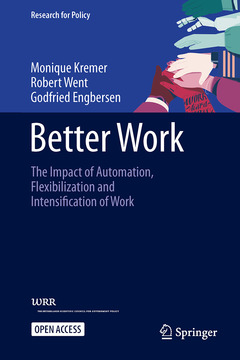Description
Better Work, 1st ed. 2021
The Impact of Automation, Flexibilization and Intensification of Work
Research for Policy Series
Authors: Kremer Monique, Went Robert, Engbersen Godfried
Language: English
Subjects for Better Work:
Keywords
Flexibilization; Open Access; Social Dialogue; Technology (robots; AI); Welfare State; Work
Approximative price 42.19 €
In Print (Delivery period: 15 days).
Add to cartPublication date: 11-2021
204 p. · 15.5x23.5 cm · Paperback
Approximative price 52.74 €
In Print (Delivery period: 15 days).
Add to cartPublication date: 11-2021
204 p. · 15.5x23.5 cm · Hardback
Description
/li>Contents
/li>Biography
/li>Comment
/li>
This Open Access book provides a thorough analysis of the quality of work in the Netherlands, and suggests policy proposals to promote and facilitate good work for more people. New technology, flexibilization and the intensification of work will have significant consequences for all those who will still have jobs in the future, and ? much less studied so far ? for the quality of their work. Good work is essential for general well-being: for the individual?s quality of life, for the economy and for society. Good work for everyone should therefore be seen as an important aspiration for companies, institutions, social partners and governments. An essential read for an international audience of academics in the field of the sociology of work, labor economics and social policy, as well as for policymakers and researchers of trade unions, and representatives of other social movements.
Chapter 1 Introduction
1.1 Three major developments: automation, flexibilization and intensification
1.2 Better work as a societal mission
1.3 Concerns about the quality of work1.4 Better work and well-being
1.5 In this book
A day at work: the truck driver
Chapter 2. The importance of better work
2.1 The meaning of paid work
2.2 Good work: insights from the social sciences
2.3 Conditions for good work
2.4 Consequences of good work for the individual, the economy and society
2.5 Conclusion: good work means control
A day at work: the primary-school teacher
Part 1. Good work: development and current status
Chapter 3. Control over income
3.1 Insecure work3.2 Social security and insecurity
3.3 Repair or revise
3.4 Security of employment and professional development
3.5 Wage development
3.6 Conclusion: control over income requires more security and less inequality
A day at work: the order picker
Chapter 4. Control over work
4.1 Busier than ever? The intensification of work
4.2 Autonomy as Achilles’ heel
4.3 Camaraderie at work
4.4 Differences in control over work: education and occupation
4.5 Who is responsible for control over work?
4.6 Conclusion: control over work requires more autonomy and camaraderie
A day at work: the IT worker
Chapter 5. Control in life
5.1 Part-time work, or looking after number one
5.2 Paid leave
5.3 Control over working hours
5.4 Blurring boundaries
5.5 Conclusion: control in life requires more than just part-time work
Part 1 – Conclusion: work could be better
A day at work: the retail floor manager
Part 2. Work for all
Chapter 6. Everyone into work
6.1 Technological developments6.2 Flexible labour market
6.3 Intensification of work
6.4 Policies to help people into work
6.5 Conclusion: new vulnerabilities, new policy challenges
A day at work: the chartered accountant
Part 3. The new societal mission
Chapter 7. Room to choose good work7.1 Globalization with policy space
7.2 Technology does not just happen
7.3 Investing in good work
7.4 A task for government
7.5 Conclusion: room for choice?
A day at work: the homecare worker
Chapter 8. Better work: conclusions and recommendations
8.1 Good work is under pressure8.2 Security of income
8.3 More control over work
8.4 Work-life balance
8.5 Better work as an objective of public policy
Bibliography
Monique Kremer is a professor of active citizenship, department of sociology, University of Amsterdam, chair of the migration advisory board, and was previously employed at the WRR. She has published numerous books on a variety of topics, such as How welfare states care (2007, Amsterdam University Press), People, Policy and the New Pofessional (2006) and Vreemden in de verzorgingsstaat (2016, Strangers in the Welfare Sttate).
Robert Went (1955) works at the WRR since 2007. He has attained a doctorate in economics with a dissertation on globalization (Routledge 2002). Before he joined the WRR, he has worked among others at the Dutch court of audit (Algemene Rekenkamer) as a project manager. He has written a lot about economic issues for the general public, and is very active on twitter (@went1955). He is also a member of the board of Rethinking Economics in The Netherlands.
Godfried Engbersen, is a professor of sociology at Erasmus University Rotterdam and a council member of the WRR. Key themes in his research are social inequality and international migration. He published numerous books, among which (with others) A Continent Moving West: EU Enlargement and Labour Migration from Central and Eastern Europe (Amsterdam University Press 2010); Beyond Networks. Feedback in International Migration (Palgrave 2016), and Cultures of Unemployment (Routledge 2019).
This book is open access, which means that you have free and unlimited access
The first book to analyses the effects of technologization, flexibilization and intensification of work for the quality of work
Offers a clear definition of ‘good work’ based on academic work from various disciplines
Suggests novel policy proposals based on a thorough analysis of the quality of work in the Netherlands
The original Dutch version of the book has been well received in the Dutch media, by employers’ organizations, trade unions, academics, and in Dutch parliament




